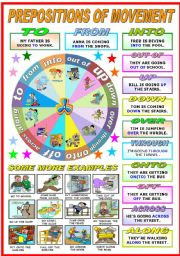Definition: A word that shows the relationships between a noun or pronoun and others words in sentences.
• Prepositions can be used with verbs and the combination is called phrasal verbs.
• Phrasal verbs carry totally different meanings and its depends on the prepositions used.
• Examples: look after, look into
→She has to look after her younger sister since her parents have gone out.
→The headmaster promised to look into discipline case.
• Preposition may be used at the end of wh-questions
◊Who are they angry with?
Prepositions of time
at two o'clock
on Wednesday
in an hour, in January; in 1992
for a day
Prepositions of place
at my house
in New York, in my hand
on the table
near the library
across the street
under the bed
between the books
Sarah walked across the street
I've never been to Africa.
The cat jumped onto the roof.
You shouldn't walk through the forest.
We ran towards the castle.
You shouldn't go into the castle.
More information :
PRONOUNS
Definition : we use personal pronouns when we want to refer to people, animals, plants or things.
- when you are referring to many people, animals or things, use they.
- If you want to refer to the person or people you are talking to, use you.
Singular
Person | Subject | Object | Possessive | Intensive Reflexive |
1st | I | me | mine | myself |
2nd | you | you | yours | yourself |
3rd | he/she/it | him/her/it | his/hers | himself/herself/itself |
Plural
Person | Subject | Object | Possessive | Intensive Reflexive |
1st | we | us | ours | ourselves |
2nd | you | you | yours | yourselves |
3rd | they | them | theirs | themselves |
- I called the lecturer because the preparation for the presentation was worrying me. My partner and I were confused. We were not clear about what was expected of us.
- He told the police what had happened to him. They are investigating the case ang my friend is leaving it to them.
- She fried the fish and ate it.
- She was teasing the horse. It chased her and kicked her in the head.
- Sometimes we add suffixes -self (singular) or -selves (plural) to words like my, your, him, her, it, our, and them.
- We do this when we want to refer to the subject of the sentence.
They blamed themselves for the accident.
You only have yourself to blame.
2. To mean 'by itself' or 'without help'
The computer turned on all the lights in the room by itself.
She did the work herself.
He went from room to room himself.
3. Possessive pronouns
This book is his. (for a boy or man)
This house is hers. (for a lady)
I use this pen every day. It is mine. (it belongs to me)
We live in this house. It is ours. (it belongs to us)
They have a red car. It is theirs. (it belongs to them)
More Information :




No comments:
Post a Comment